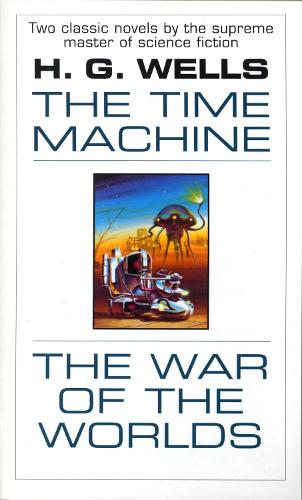
The Time Machine and The War of the Worlds: Two Novels in One Volume
(Paperback)
Publishing Details
The Time Machine and The War of the Worlds: Two Novels in One Volume
By (Author) H. G. Wells
Random House USA Inc
Ballantine Books Inc.
12th April 1986
United States
Classifications
General
Fiction
FIC
Physical Properties
Paperback
288
Width 105mm, Height 172mm, Spine 20mm
164g
Description
The Time Machine When the Time Traveller courageously stepped out of his machine for the first time, he found himself in the year 802,700-and everything had changed. In this unfamiliar, utopian age creatures seemed to dwell together in perfect harmony. The Time Traveller thought he could study these marvelous beings-unearth their secret and then return to his own time-until he discovered that his invention, his only avenue of escape, had been stolen. H. G. Wells's famous novel of one man's astonishing journey beyond the conventional limits of the imagination first appeared in 1895. It won him immediate recognition and has been regarded ever since as one of the great masterpieces in the literature of science fiction. The War of the Worlds H. G. Wells's science fiction classic, the first novel to explore the possibilities of intelligent life from other planets, is still startling and vivid nearly a century after its appearance, and a half century after Orson Welles's infamous 1938 radio adaptation. This daring portrayal of aliens landing on English soil, with its themes of interplanetary imperialism, technological holocaust, and chaos, is central to the career of H. G. Wells, who died at the dawn of the atomic age. The survival of mankind in the face of "vast and cool and unsympathetic" scientific powers spinning out of control was a crucial theme throughout his work. Visionary, shocking, and chilling, The War of the Worlds has lost none of its impact since its first publication in 1898.
Author Bio
H. G. Wells was born Herbert George in Bromley, Kent, England, on September 21, 1866. His father was a professional cricketer and sometimes shopkeeper, his mother a former lady's maid. Although "Bertie" left school at fourteen to become a draper's apprentice (a life he detested), he later won a scholarship to the Normal School of Science in London, where he studied with the famous Thomas Henry Huxley. He began to sell articles and short stories regularly in 1893. In 1895, his immediately successful novel rescued him from a life of penury on a schoolteacher's salary. His other "scientific romances"-The Island of Dr. Moreau(1896),The Invisible Man(1897),The War of the Worlds(1898),The First Men in the Moon(1901), andThe War in the Air(1908)-won him the distinction as the father of science fiction. Henry James saw in Wells the most gifted writer of the age, but Wells, having coined the phrase "the war that will end war" to describe World War I, became increasingly disillusioned and focused his attention on educating mankind with his bestsellingOutline of History(1920) and his later utopian works. Living until 1946, Wells witnessed a world more terrible than any of his imaginative visions, and he bitterly observed- "Reality has taken a leaf from my book and set itself to supercede me."
